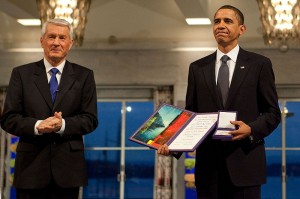Cross-posted from Consortium News

Barack Obama is at a crossroads of his presidency: one path leads to heightened conflicts favored by Official Washington's neoconservatives and liberal interventionists; the other requires cooperation with past adversaries, such as Russia and Iran, in the cause of peace.
For the first five-plus years of his administration, Obama has sought to straddle this divide, maintaining traditional U.S. alliances that have pushed for Washington's violent interference in the affairs of other countries, particularly in the Middle East, but also collaborating behind the scenes with Russia to ease some tensions.
But the days of such splitting the difference are ending. Obama will soon have to decide to either stand up to the still influential neocons as well as hawks in his own administration and seek help from Russia and Iran to resolve conflicts in Syria, Iraq, Palestine and elsewhere -- or join the neocon warpath against Russia, Iran and Syria.
This departure from the old ways would require realistic negotiations over the Syrian civil war, accepting the continued rule of President Bashar al-Assad at least for the near future; reaching an agreement over Iran's nuclear program; and resolving the Ukraine crisis in a way that addresses Russia's security concerns, including accepting Crimea's decision to rejoin Russia, agreeing to a federated structure for Ukraine and keeping Ukraine out of NATO.
Sticking to the other route would follow the interests of Saudi Arabia and Israel into new conflicts: deeper intervention in Syria's civil war with the goal of overthrowing Assad; rejection of Iran's offers to compromise on its nuclear program; and intensified confrontation with Russia over Ukraine.
This "tough-guy-ism" would surely make Official Washington's pundits and pols happy. They could boast about American resolve in support of "freedom" and "human rights" -- even if it led to worse tyranny, mass killings and economic pain.
For instance, the worsening crisis in Ukraine could be expected to make life even more miserable for Ukrainians while also possibly disrupting gas supplies to Europe, throwing the Continent back into recession and likely stunting U.S. economic growth, too.
Plus, stepped-up U.S. intervention in Syria, such as sending more sophisticated weapons to the supposedly "moderate opposition" and possibly conducting American airstrikes to degrade Assad's military, might instead tip the balance toward victory by Sunni extremists allied with al-Qaeda, which might force a direct U.S. military intervention.
Feeding the flames of the region's Sunni-Shiite sectarian conflicts also would likely increase the death and destruction in Iraq, worsening that tragic country's agony while also disrupting oil production which would further damage the world's economy.
By rejecting Iran's proposals for constraining but not eliminating its nuclear program, the Obama administration would please Israel's Prime Minister Benjamin Netanyahu and Saudi King Abdullah, especially if it were followed by U.S. airstrikes on Iran's nuclear facilities.
But most likely a new war in Iran would just get lots of Iranians killed and further enflame the hatreds across the Middle East, including at the United States through new acts of international terrorism. Any acts of terrorism would, naturally, strengthen American "resolve" to kill more Middle Easterners.
Beyond the human misery in the region from all this violence, there would be an extreme economic cost on the West comparable to the damage done by George W. Bush's Iraq War, which deepened the U.S. debt by $1 trillion or more and contributed to the financial crisis of 2008 which cost millions of Americans and Europeans their jobs and homes.
More of these economic dislocations could be expected if Obama pursues the neocon-preferred course of ever-wider confrontations. [See Consortiumnews.com's "Why Neocons Seek to Destabilize Russia."]
Weakening America
So, the path of heightened confrontations might inspire a sense of moral righteousness as the United States mows down "enemies" across the Middle East and gives a "bloody nose" to Russia over Ukraine. But it also might accelerate the overall decline in America's world standing by bringing more ruin on the U.S. economy, the country's greatest strength.
Taking this "tough-guy" route also would likely not resolve anything in the long term anymore than Bush's invasion did in Iraq or Obama's bombing campaign did in Libya. Those operations removed dictators -- Saddam Hussein in Iraq and Muammar Gaddafi in Libya -- but they also unleashed sectarian and political havoc inside those two countries.
(Note: You can view every article as one long page if you sign up as an Advocate Member, or higher).





